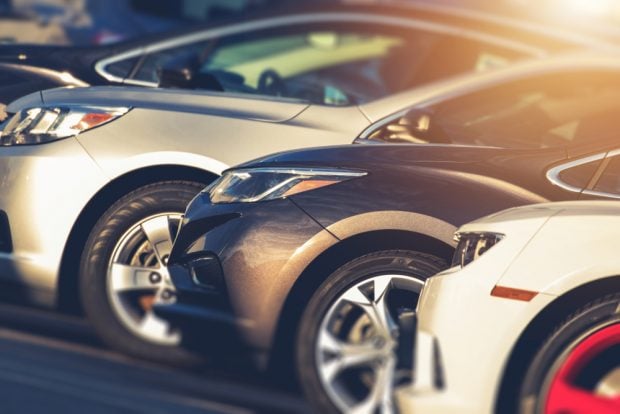 Pre-owned vehicles for sale. (Source: Shutterstock)
Pre-owned vehicles for sale. (Source: Shutterstock)
Fear of COVID-19 is waning as a reason to avoid shopping for a car, but fears of being laid off and paying high costs are rising, according to a TrueCar Inc. survey.
And a forecast released Thursday by Edmunds, a car-buying analytics company based in Santa Monica, Calif., predicted consumers will have a harder time finding cars at an affordable price this year because of severe parts shortages for automakers.
Recommended For You
"The only relief that price-sensitive car shoppers might find might be in lower interest rates and the increased value of their trade-in," Ivan Drury, Edmunds' senior manager of insights, said.
Edmunds found U.S. dealers had 36% fewer new cars and trucks on their lots in March than they did a year earlier, leading prices to rise for both new and used vehicles.
Edmunds analysts estimated the average transaction price for new vehicles was $40,563 in March, up 5.1% from $38,601 a year ago. The price for used vehicles was $22,663, up 11.8% from $20,273 last year.

Full-size trucks and large SUVs are among the most scarce. Edmunds found full-size truck inventory in March was down 60% from a year earlier. As a result, full-size truck prices have risen 7% to $54,763 for new in March and 22.3% to $34,445 for used.
Large SUV inventory fell 56% over the past year, and their prices have risen 7.9% to $67,542 for new and 12.2% to $35,035 for used.
"The chipset shortage has snowballed into a bigger crisis for the automotive industry," Jessica Caldwell, Edmunds' executive director of insights, said.
"Major auto manufacturing plants are implementing temporary closures," Caldwell said. "We're seeing the industry being hit hard on both sides: Retail customers are being offered fewer choices and paying higher prices, while fleet customers are likely seeing their orders delayed as auto manufacturers shift their focus to serving consumers."
Edmunds analysts found "affluent consumers have continued to drive a significant portion of financed purchases" in the first quarter, based on increases in down payments and decreases in average amounts financed.
Down payments rose 11.4% to $4,729 for new cars and 24.9% to $3,345 for used cars in the past 12 months.
In the first quarter, 88.1% of the price of new cars was financed, down from 88.8% a year earlier and 88.2% in the fourth quarter. For used cars, 87.7% was financed in the first quarter, down from 89.2% a year earlier, and 88.1% in the fourth quarter.
Meanwhile, TrueCar's survey released Wednesday found shortages and higher prices are part of what is keeping some Americans from shopping for another car. The results represented the eighth wave of the survey that the Santa Monica, Calif., company's began in March 2020, when COVID-19 was declared a pandemic.
Nick Woolard, TrueCar's lead industry analyst, said the factory closures and vehicle shortages have affected consumer attitudes.
"This helps explain why over a third of consumers indicated that not having the car they want on the dealer lot is delaying or deterring their car purchase, impacting the demand side of the market," Woolard added.
TrueCar fielded the survey March 12 with a sample size of 1,200 people. Findings include:
- 29% indicated that their vehicle needs have increased as a result of the pandemic — more consumers than any prior survey.
- 23% indicated that they would purchase a less expensive vehicle — more than any prior wave
- 30% were deterred from buying by actual diminished income due to COVID-19 — the lowest level since the surveys began in March 2020, when it was 36% and down from its peak of 38% in April 2020.
- 35% were deterred by concern that their income could be diminished in the future — the highest for this reason since November, which was also 35%.
- 35% were deterred by dealerships not having the vehicle they wanted — the highest since the question was first posed in July 2020.
- 31% were deterred by the threat of catching or spreading COVID-19 while shopping — the lowest since the survey began and down from a peak of 45% in April 2020 and 38% in the previous survey in January.
Wendy McMullin, TrueCar's head of research and consumer insights, said accelerating vaccinations and warmer spring weather is allowing for more outdoor activity.
"So, it's no surprise that we're seeing somewhat less concern over COVID-19 transmission while vehicle shopping," she said. "Instead, we're seeing financial concerns emerge as stronger purchase deterrents, possibly reflecting the return of less affluent shoppers to the market."
© Touchpoint Markets, All Rights Reserved. Request academic re-use from www.copyright.com. All other uses, submit a request to [email protected]. For more inforrmation visit Asset & Logo Licensing.







